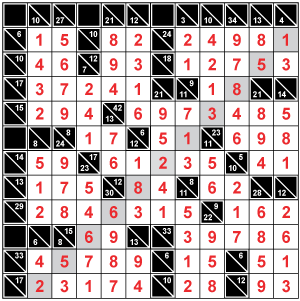Puzzled...
As some of you may know, I am kind of a word puzzle junkie. I love to buy those magazines that contain "variety" puzzles rather than just crossword books, because I like the...well...variety of many different types of word and number puzzles.
Blame my mother. She was also buying and working these puzzle books as far back as I can remember, and I know that I was quite young when I expressed an interest in first watching, then helping, then doing the puzzles myself. Over the years of my youth, then young adulthood, I had other interests that kept me from always wanting to spend my time engaging my brain with these fun word challenges, but now, as I am just beginning to approach the middle years of my adult life, I am finding that working on puzzles (not just word, but also jigsaws, and other similar types of games) is not only enjoyable, but serves to keep my mind sharp.
We haven't yet gotten to the "observational" part of this post. Indulge me for a little bit longer.
One of the puzzles that I started working on as a kid is known as a Cross Sums. It's a grid of squares with blocks laid out in a crossword fashion (usually, but not always, diagonally symmetrical); rather than words, however, the squares are filled with a unique arrangement of digits. These digits are determined by using the provided numbers embedded in the black squares, which represent the sums of their respective rows or columns. The rules are that there are no zeroes, and there are no repeated digits in any row or column.

So, there might be a black square containing a 23 adjacent to a row of three squares. There is only one combination of three unique digits that will total 23 - 6-8-9 - but there are six different permutations of these three: 689, 698, 869, 896, 968, 986. Where each digit is placed depends upon the solutions to the connecting columns, which are determined by other connecting rows, etc.
Now that I've thoroughly bored you with that description (maybe I should have let Wikipedia do the talking), let me get to one of the observations that I've made. It seems that only in the last few months have people been referring to Cross Sums as Kakuro. Since when was this puzzle a Japanese invention? I mean, if it is, then that's fine, but then why didn't the puzzle book producers call it Kakuro rather than Cross Sums? And why, all of a sudden, are they the new hottest craze behind Sudoku?
And another thing. I have also been doing Sudoku puzzles for most of my life, and they, too, were suddenly invented by the Japanese. Only then did they become a huge, out-of-control craze that people cannot get enough of. Where was the Number Place love in the 80s and 90s? Fact: Sudoku was invented by Howard Gams in Indianapolis in 1979, based upon ancient Latin squares. In 1986, Japanese publisher Nikoli began printing the puzzles in their magazines, and they didn't really achieve worldwide popularity until last year. All that to say, I'm gonna keep calling them Number Place, thank you very much.
Now, here's the real reason why I began this post. It isn't about Cross Sums, Sudoku or any other word puzzles at all. It's all about laughing at someone's misspelling of a very ironic word. Today, as I was looking up Cross Sums on the Internet, I ran across a page that referenced them, and that page had several links to other related games and topics. Here's the links box (red emphasis mine):

Doesn't it seem that, if there was any word in one's vocabulary that should be spelled correctly, that "education" should be it? Perhaps this person suffers from mkriobes. It boggles the mind.
No, wait. It puzzles the mind.







2 Talked Back:
At July 8, 2006 at 9:46:00 PM CDT, KB said...
KB said...
I recently got a resume from someone bragging about their "attenttion" to detail. Seriously.
At July 8, 2006 at 11:41:00 PM CDT, Jim said...
Jim said...
huh?
Okay, now it's your turn | Home